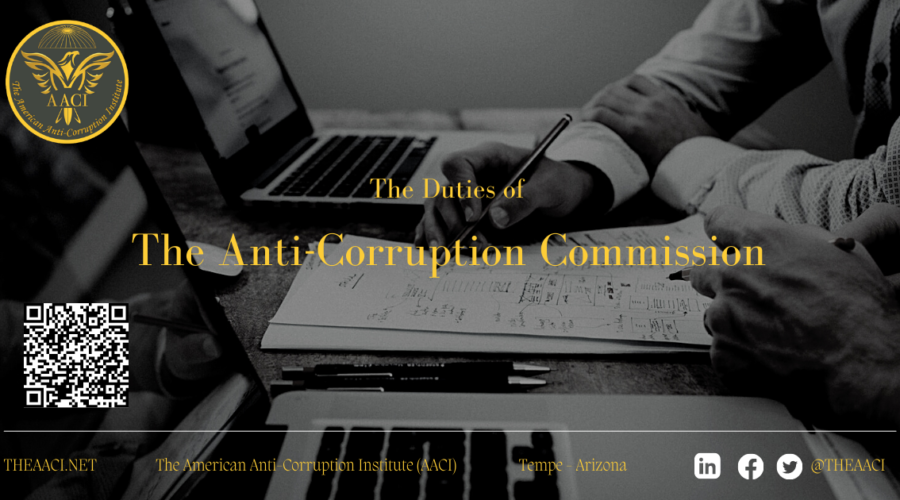Mike J. Masoud
March 11, 2022
Each country that ratified the United Nations Against Corruption (UNCAC) should comply with its provisions. Article 6 of the UNCAC requires member states to “ensure the existence of a body or bodies, as appropriate, that prevent corruption.” Countries must have an Anti-Corruption Commission to comply with the UNCAC.
Chapter II Preventive Measures
Chapter 2 focuses on preventive measures. It includes articles 5-14 of the Convention. The following are articles 5 and 6 of the Convention:
Article 5. Preventive anti-corruption policies and practices
1. Each State Party shall, in accordance with the fundamental principles of its legal system, develop and implement or maintain effective, coordinated anti-corruption policies that promote the participation of society and reflect the principles of the rule of law, proper management of public affairs and public property, integrity, transparency and accountability.
2. Each State Party shall endeavour to establish and promote effective practices aimed at the prevention of corruption.
3. Each State Party shall endeavour to periodically evaluate relevant legal instruments and administrative measures with a view to determining their adequacy to prevent and fight corruption.
4. States Parties shall, as appropriate and in accordance with the fundamental principles of their legal system, collaborate with each other and with relevant international and regional organizations in promoting and developing the measures referred to in this article. That collaboration may include participation in international programmes and projects aimed at the prevention of corruption.
UNCAC, https://www.unodc.org/documents/treaties/UNCAC/Publications/Convention/08-50026_E.pdf, Page 9. Accessed on March 11, 2022
Article 6. Preventive anti-corruption body or bodies
1. Each State Party shall, in accordance with the fundamental principles of its legal system, ensure the existence of a body or bodies, as appropriate, that prevent corruption by such means as:
(a) Implementing the policies referred to in article 5 of this Convention and, where appropriate, overseeing and coordinating the implementation of those policies;
(b) Increasing and disseminating knowledge about the prevention of corruption.
2. Each State Party shall grant the body or bodies referred to in para- graph 1 of this article the necessary independence, in accordance with the fundamental principles of its legal system, to enable the body or bodies to carry out its or their functions effectively and free from any undue influence. The necessary material resources and specialized staff, as well as the training that such staff may require to carry out their functions, should be provided.
3. Each State Party shall inform the Secretary-General of the United Nations of the name and address of the authority or authorities that may assist other States Parties in developing and implementing specific measures for the prevention of corruption.
UNCAC, https://www.unodc.org/documents/treaties/UNCAC/Publications/Convention/08-50026_E.pdf, Page 10. Accessed on March 11, 2022
Duties of the Anti-Corruption Commission
Article 6 is the driving force behind the establishment of anti-corruption commissions that we have seen in numerous countries during the last seventeen years. It stipulates the minimum duties of the anti-corruption commission. Due to its direct relation with the duties of the anti-corruption commission, the reader should fully be aware of the basics of article 5.
Article 5 requires member countries to:
1. Develop and implement or maintain effective, coordinated anti-corruption policies that promote (a) the participation of society and (b) reflect the principles of [1]
a. the rule of law,
b. proper management of public affairs and public property,
c. integrity,
d. transparency, and
e. accountability.
2. Endeavor to establish and promote effective practices aimed at the prevention of corruption.
3. Endeavor to periodically evaluate relevant legal instruments and administrative measures to determine their adequacy to prevent and fight corruption.
4. Collaborate with each other to promote and develop measures referred to in article 6(1-3).
As it is explicitly stated above, the governments of member states are requested to establish and maintain anti-corruption policies in all economic sectors. These corruption prevention-oriented policies should be designed to engage citizens and promote the principles of the rule of law, proper public administration, integrity, transparency, and accountability.
Governments are responsible to promote corruption prevention in their societies. For example, they should design and promote corruption prevention courses, programs, and contests at schools, universities, and academic research centers. In addition, member states should ensure that their judicial branch of governance is effective and equipped with the proper resources to perform its duties concerning corruption prevention. It is not enough to have the properly designed relevant laws and rules. Justice will be served when the administration of the entire spectrum of the Judiciary is efficient and effective.
The duties of the Anti-Corruption Commission (ACC) are stated in article 6 of the UNCAC. The AAC is requested to:
1. Prevent corruption. Member states should, for example, (a) implement the policies referred to in UNCAC article 5 and, where necessary, oversee and coordinate their implementation; and (b) increase and promote knowledge concerning corruption prevention.
2. Following the fundamental principles of their legal systems, member states shall allow the body or bodies (i.e. the ACC) the essential independence to enable the body or bodies to carry out their functions effectively and without undue interference. It is necessary to offer the necessary material resources and specialist personnel, as well as the training that such personnel may require to carry out their duties.
The ACC has to ensure that its government applies article 5 of the Convention effectively, efficiently, and timely. Besides, it should promote corruption prevention knowledge in all economic sectors. The nature, magnitude, and intensity of knowledge are dependent on several variables. For example, the target audience, economic sector, and current anti-corruption literacy.
The effectiveness of the ACC is heavily reliant on its “true” independence. It should also have enough professionally qualified staff and financial resources to meet its strategic objectives. The ACC needs proper and enough recurrent training for a variety of reasons and needs, including improving its deterring professional image.
Whether it is called Anti-Corruption Commission or any other name. Whether there are one or more such bodies in the country, the crux of the matter is straightforward: Does such body or bodies do the job in compliance with article 6 of the UNCAC? The UNCAC is a legally binding international agreement. Negligent or gross negligence conduct shall eventually result in damages, I believe!
NOTES
[1] Read more about the Ten Principles of Fighting Corruption promulgated by The American Anti-Corruption Institute (AACI)Photo by Scott Graham on Unsplash











































